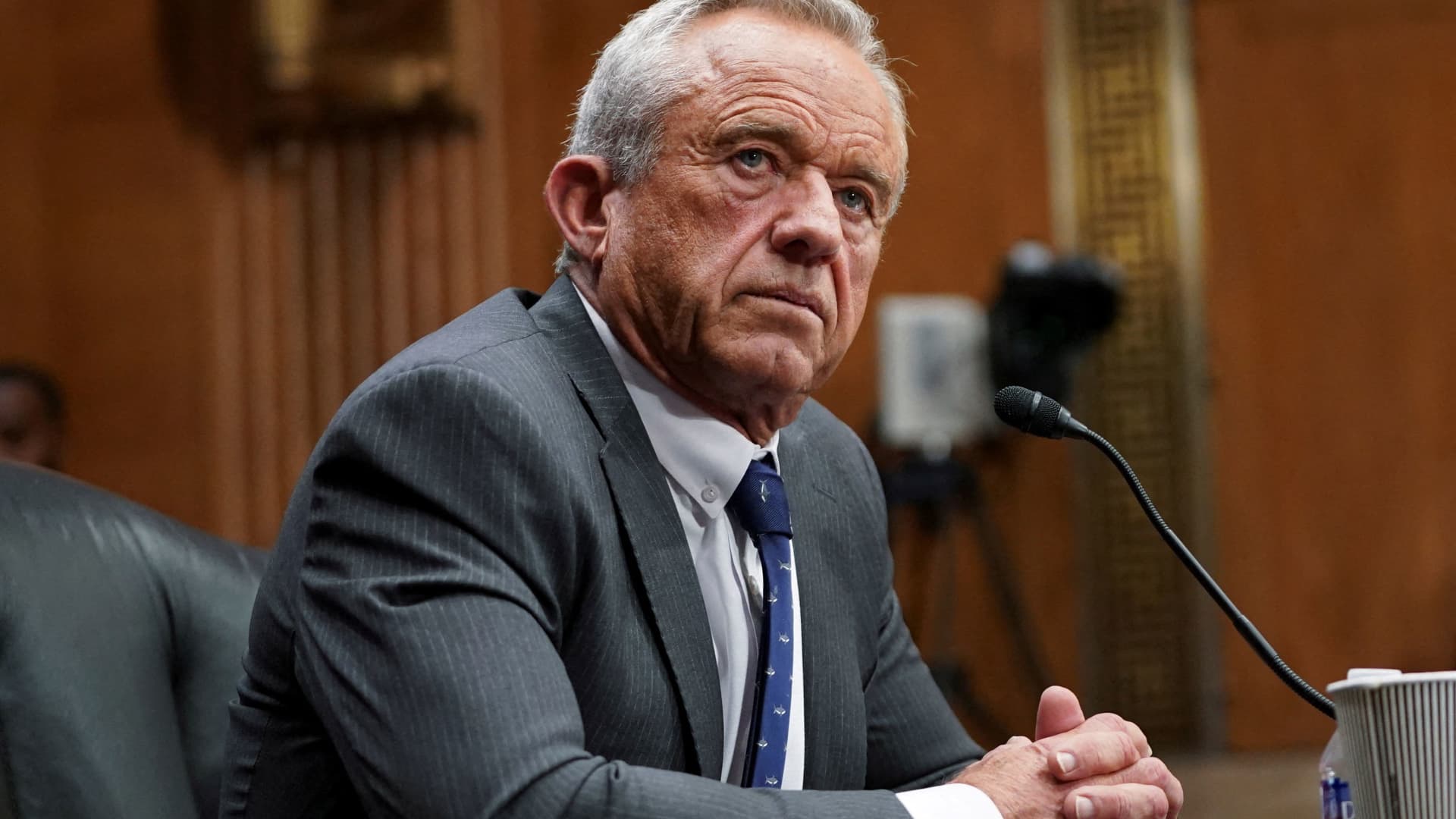Global Trends and Politics
Vaccine Stocks Tumble

Senate Panel Advances Nomination of Vaccine Skeptic to Lead Health and Human Services
Nathan Howard | Reuters
Shares of Vaccine Companies Fall Following Senate Committee Vote
Shares of vaccine companies fell on Tuesday after a Senate panel voted to advance Robert F. Kennedy Jr.’s nomination to lead the Department of Health and Human Services to the full chamber. The committee voted 14 to 13 to advance Kennedy in a party-line vote around 10:30 a.m. ET.
Vaccine Company Stock Performance
Moderna’s stock fell about 6%, while shares of BioNTech dropped nearly 2%. Shares of Novavax fell nearly 1%, and GSK’s stock dropped slightly. Pfizer’s stock fell more than 1%, even after the company reported fourth-quarter results that topped expectations. Their shares initially fell by larger margins following the Senate committee vote, then regained some ground.
Kennedy’s Background and Controversies
Kennedy, 71, is a notorious vaccine skeptic, making false claims that vaccines are linked to autism despite decades of studies that debunk that association. However, during Senate confirmation hearings last week, Kennedy contended that he is not “anti-vaccine.”
Founding of Nonprofit Children’s Health Defense
Kennedy is also the founder of the nonprofit Children’s Health Defense, the most well-funded anti-vaccine organization in the U.S. In a government ethics agreement last month, he said he stopped serving as chairman or chief legal counsel for the organization as of December.
Concerns Over Potential Impact on Public Health
If confirmed by the Senate, Kennedy would oversee federal health agencies that regulate vaccines and other drugs. Some health policy experts have raised concerns about Kennedy using his new potential platform to spread anti-vaccine rhetoric and deter Americans from receiving recommended shots at a time when vaccination rates are already falling, especially among children.
Pfizer CEO’s Concerns
During an industry conference in January, Pfizer CEO Albert Bourla said Kennedy’s anti-vaccine rhetoric is in “complete contradiction” with what the company, regulators, and the medical and scientific community believe.
Conclusion
The advancement of Robert F. Kennedy Jr.’s nomination to lead the Department of Health and Human Services has raised concerns among health policy experts and the medical community. As a vaccine skeptic, Kennedy’s views on the safety and efficacy of vaccines are at odds with decades of scientific research and evidence. If confirmed, his leadership could potentially undermine public trust in vaccines and lead to a decline in vaccination rates, with potential consequences for public health.
FAQs
Q: What is the significance of the Senate committee vote?
A: The vote advances Kennedy’s nomination to lead the Department of Health and Human Services to the full Senate for a final confirmation vote.
Q: What are the concerns about Kennedy’s nomination?
A: Some health policy experts are worried that Kennedy’s anti-vaccine views could lead to a decline in vaccination rates and undermine public trust in vaccines.
Q: What are the potential consequences of Kennedy’s confirmation?
A: If confirmed, Kennedy’s leadership could lead to a decline in vaccination rates, potentially resulting in outbreaks of preventable diseases and a negative impact on public health.
Global Trends and Politics
Netflix Q1 2025 Earnings

Netflix Posts Major Earnings Beat
Netflix posted a major earnings beat Thursday, as revenue grew 13% during the first quarter of 2025. The streamer attributed its better-than-expected revenue to higher-than-forecast subscription and advertising dollars.
Earnings Report Details
In late January, the company increased its pricing across the board, raising its standard plan to $17.99 a month, its ad-supported plan to $7.99, and its premium plan to $24.99. The report marks the first time the streaming giant did not disclose quarterly subscriber data, as it shifts its strategy to focus on revenue and other financial metrics as performance indicators.
Market Impact
Netflix’s earnings also come as traditional media stocks have been slammed by a tumultuous market prompted by President Donald Trump’s trade policy. However, Netflix said it continues to forecast full-year revenue of between $43.5 billion and $44.5 billion. "There’s been no material change to our overall business outlook," the company said in a statement Thursday.
Executive Insights
As investors worry about the potential impact of tariffs on consumer spending and confidence, Netflix’s co-CEO Greg Peters said on the company’s earnings call, "Based on what we are seeing by actually operating the business right now, there’s nothing really significant to note." Peters added, "We also take some comfort that entertainment historically has been pretty resilient in tougher economic times. Netflix, specifically, also, has been generally quite resilient. We haven’t seen any major impacts during those tougher times, albeit over a much shorter history."
Financial Performance
Netflix shares gained about 2% in extended trading Thursday. Here’s how the company performed for the quarter ended March 31:
- Earnings per share: $6.61 vs. $5.71 expected
- Revenue: $10.54 billion vs. $10.52 billion expected
Net income for the period was $2.89 billion, or $6.61 per share, up from $2.33 billion, or $5.28 per share, during the same quarter a year earlier. Revenue in the first quarter jumped nearly 13% year over year, reaching $10.54 billion.
Advertising Strategy
Netflix has been leaning on advertising as it seeks to soften slowing subscriber growth. "A key focus in 2025 is enhancing our capabilities for advertisers," it said. The company launched its in-house ad tech platform in early April in the U.S., with plans to extend into other markets in the coming months. "We believe our ad tech platform is foundational to our long term ads strategy," the company said. "Over time, it will enable us to offer better measurement, enhanced targeting, innovative ad formats and expanded programmatic capabilities."
Conclusion
Netflix’s strong earnings report suggests that the company is well-positioned for continued growth, despite challenges in the broader market. With its focus on revenue and advertising, Netflix is likely to remain a major player in the streaming industry.
FAQs
Q: What was Netflix’s revenue growth in the first quarter of 2025?
A: Netflix’s revenue grew 13% during the first quarter of 2025.
Q: Why did Netflix increase its pricing across the board in January?
A: Netflix increased its pricing to raise its standard plan to $17.99 a month, its ad-supported plan to $7.99, and its premium plan to $24.99.
Q: What is Netflix’s forecast for full-year revenue?
A: Netflix forecasts full-year revenue of between $43.5 billion and $44.5 billion.
Q: How did Netflix’s shares perform after the earnings report?
A: Netflix shares gained about 2% in extended trading Thursday.
Q: What is Netflix’s strategy for advertising in 2025?
A: A key focus in 2025 is enhancing our capabilities for advertisers, including the launch of its in-house ad tech platform.
Global Trends and Politics
The Retail Industry’s CSR Conundrum: Balancing Profit and Purpose

Corporate social responsibility and politics have become increasingly intertwined in the retail industry, as companies face growing pressure to prioritize social and environmental concerns alongside profit. In recent years, consumers have become more aware of the impact of their purchasing decisions on the environment and society, driving demand for sustainable and responsible business practices. As a result, retailers are grappling with the challenge of balancing their bottom line with their social and environmental responsibilities.
The Evolution of CSR in Retail
The concept of corporate social responsibility (CSR) has been around for decades, but its significance in the retail industry has grown exponentially in recent years. In the past, CSR was often seen as a peripheral concern, with companies viewing it as a way to enhance their reputation rather than a core aspect of their business strategy. However, with the rise of social media and increasing consumer awareness, CSR has become a critical component of a company’s brand identity and reputation.
From Philanthropy to Sustainability
In the early days of CSR, retailers focused primarily on philanthropic efforts, such as donating to charitable causes or sponsoring community events. While these efforts were well-intentioned, they often lacked a clear connection to the company’s core business operations. In recent years, however, retailers have begun to shift their focus towards sustainability, recognizing the critical role they play in reducing their environmental footprint and promoting social justice. For example, companies like Patagonia and REI have made significant investments in sustainable supply chain practices, renewable energy, and environmental conservation efforts.
The Business Case for CSR
While some may view CSR as a costly distraction from a company’s core business objectives, the evidence suggests that it can have a positive impact on the bottom line. A study by Harvard Business Review found that companies with strong CSR track records tend to outperform their peers financially, with higher returns on investment and lower volatility. Additionally, a survey by Nielsen found that 75% of millennials are willing to pay more for products and services from companies that prioritize social and environmental responsibility.
Enhancing Brand Reputation and Customer Loyalty
CSR efforts can also have a profound impact on a company’s brand reputation and customer loyalty. When consumers perceive a company as committed to social and environmental responsibility, they are more likely to trust the brand and become loyal customers. For example, companies like Warby Parker and TOMS have built their brands around social responsibility, with initiatives like “buy one, give one” programs and sustainable manufacturing practices. These efforts have not only enhanced their brand reputation but also driven customer loyalty and retention.
Challenges and Opportunities in Implementing CSR
While the benefits of CSR are clear, implementing effective CSR strategies can be a complex and challenging process. Retailers must navigate a range of stakeholders, including suppliers, employees, customers, and investors, each with their own expectations and priorities. Additionally, CSR initiatives can be costly and time-consuming to implement, requiring significant investments in resources and infrastructure.
Supply Chain Transparency and Accountability
One of the key challenges in implementing CSR is ensuring transparency and accountability throughout the supply chain. Retailers often rely on complex networks of suppliers and manufacturers, making it difficult to track and monitor social and environmental practices. Companies like Apple and Gap have faced criticism for labor practices in their supply chains, highlighting the need for greater transparency and accountability. To address this challenge, retailers are increasingly adopting technologies like blockchain and artificial intelligence to track and monitor their supply chains.
Politics and CSR: A Global Perspective
The intersection of politics and CSR is a critical aspect of the retail industry’s CSR conundrum. Governments and policymakers are increasingly expecting companies to prioritize social and environmental responsibility, with regulations and laws aimed at promoting sustainability and reducing environmental impact. For example, the European Union’s Circular Economy Package aims to reduce waste and promote sustainable consumption, while the US government has introduced laws aimed at reducing carbon emissions and promoting renewable energy.
Global Trends and Initiatives
Global trends and initiatives are also driving the retail industry’s CSR agenda. The United Nations’ Sustainable Development Goals (SDGs) provide a framework for companies to prioritize social and environmental responsibility, with goals like reducing poverty, promoting sustainable consumption, and protecting the environment. Companies like Unilever and Nestle have made significant commitments to the SDGs, with initiatives aimed at reducing their environmental footprint and promoting social justice.
Conclusion
The retail industry’s CSR conundrum is a complex and multifaceted challenge, requiring companies to balance profit and purpose in a rapidly changing business environment. While the benefits of CSR are clear, implementing effective CSR strategies can be a challenging and costly process. As consumers, policymakers, and stakeholders continue to drive demand for social and environmental responsibility, retailers must prioritize transparency, accountability, and sustainability throughout their operations. By doing so, they can build trust, drive customer loyalty, and contribute to a more sustainable and equitable future.
Frequently Asked Questions
What is CSR, and why is it important in the retail industry?
CSR, or corporate social responsibility, refers to a company’s efforts to prioritize social and environmental responsibility alongside profit. In the retail industry, CSR is critical for building trust, driving customer loyalty, and contributing to a more sustainable and equitable future.
How can retailers implement effective CSR strategies?
Retailers can implement effective CSR strategies by prioritizing transparency and accountability throughout their operations, investing in sustainable supply chain practices, and promoting social justice and environmental conservation efforts.
What are the benefits of CSR for retailers?
The benefits of CSR for retailers include enhanced brand reputation, increased customer loyalty, and improved financial performance. CSR efforts can also help retailers to reduce their environmental footprint, promote social justice, and contribute to a more sustainable and equitable future.
How can consumers support retailers that prioritize CSR?
Consumers can support retailers that prioritize CSR by researching their social and environmental practices, choosing products and services from companies that prioritize sustainability and social responsibility, and providing feedback and advocacy to drive positive change.
What role do governments and policymakers play in promoting CSR in the retail industry?
Governments and policymakers play a critical role in promoting CSR in the retail industry by introducing regulations and laws aimed at promoting sustainability and reducing environmental impact. They can also provide incentives and support for companies that prioritize social and environmental responsibility, driving positive change and promoting a more sustainable and equitable future.
Global Trends and Politics
Trump’s Tariffs Hit Canadian Small Businesses Hard

Introduction to Trade Tensions
Just across the U.S.-Canada border, some small businesses are taking tariffs personally. President Donald Trump has said his wide-sweeping tariffs, even on some of the country’s closest trade partners, will rebalance international trade and bring manufacturing back stateside. But for the U.S.’s northern neighbors, tariffs may mean an erosion of trust.
Historical Trade Relationship
The country’s trade relationship with Canada has historically been integral to both national economies. In 2024, the trade of goods between both nations totaled $762.1 billion. According to the Office of the United States Trade Representative, Canada exported over three-quarters of its goods to the U.S. last year, and U.S. imports accounted for almost half of all goods it brought in.
Tariffs and Retaliation
Starting in March, however, the Trump administration implemented a 10% tariff on Canadian energy and 25% tariffs on other imports from Canada and Mexico, a levy he’d promised on Inauguration Day. But he exempted many imports covered under the United States-Mexico-Canada agreement. Trump also put a 25% tariff on vehicles not assembled in the U.S. that took effect earlier this month, a move that affects both Mexico and Canada, two major auto production hubs. In addition, a 25% tariff on auto parts is set to take effect next month. Canada has responded with its own retaliatory tariffs, but national pride has sparked another kind of resistance.
Canadian Resistance
Balzac’s Coffee Roasters, a chain of cafes across Ontario and Toronto, has responded to trade tensions with a renamed menu item: the Americano — a commonplace espresso drink — is now a maple leaf-marked "Canadiano." Your Independent Grocers, a chain of independently owned supermarkets under the Canadian-traded Loblaw Companies, uses its own maple leaf badge to indicate products "prepared in Canada." The grocer also indicates tariff-impacted items with a "T" logo in stores and online.
Impact on Small Businesses
Corinne Pohlmann is the executive vice president of advocacy at the Canadian Federation of Independent Business, of CFIB, which represents over 100,000 small businesses across 12 of Canada’s 13 territories and provinces. About half of CFIB members are directly involved in either importing or exporting from the U.S., according to the organization’s December 2024 survey. That metric does not include reliance on suppliers and customers who are also trading with the U.S. More than a quarter of CFIB members surveyed in late March reported seeing stronger demand for Canadian-owned products. More than half of the surveyed businesses agreed that the U.S. is not a reliable trading partner.
Emotional Distress and Eroded Trust
The trade tensions have extended to some long-standing relationships between U.S. and Canadian small businesses, she said, as entrepreneurs decide which side of the border will absorb the costs of new tariffs. Pohlmann recalled some CFIB members asking for guidance on how to renegotiate contracts with partners to the south. Pohlmann said the tariffs are causing emotional distress, in addition to cost increases. "For a lot of Canadians, it felt like a betrayal," Pohlmann said.
Conclusion
The tariffs imposed by the U.S. on Canada have caused significant distress and eroded trust among Canadian businesses. Even if President Trump lessens tariffs, Canadian businesses may be hesitant to rebuild trading relationships with U.S. partners. CFIB’s Pohlmann pointed to lost contracts and eroded trust. "While we’d welcome a permanent reprieve from tariffs, the trading relationship between Canada and the United States has been fractured and may never be the same again," Pohlmann said.
FAQs
Q: What is the current trade relationship between the U.S. and Canada?
A: The trade relationship between the U.S. and Canada has historically been integral to both national economies, with Canada exporting over three-quarters of its goods to the U.S. and U.S. imports accounting for almost half of all goods it brought in.
Q: What tariffs has the U.S. imposed on Canada?
A: The U.S. has imposed a 10% tariff on Canadian energy and 25% tariffs on other imports from Canada and Mexico, as well as a 25% tariff on vehicles not assembled in the U.S.
Q: How have Canadian businesses responded to the tariffs?
A: Canadian businesses have responded with a mix of resistance and retaliation, including renaming menu items, using maple leaf badges to indicate products "prepared in Canada," and indicating tariff-impacted items with a "T" logo.
Q: What is the impact of the tariffs on small businesses in Canada?
A: The tariffs have caused significant distress and eroded trust among Canadian businesses, with many reporting lost contracts and increased costs.
Q: Will the trade relationship between the U.S. and Canada ever be the same again?
A: According to CFIB’s Pohlmann, the trading relationship between Canada and the United States has been fractured and may never be the same again, even if President Trump lessens tariffs.
-

 Career Advice4 months ago
Career Advice4 months agoInterview with Dr. Kristy K. Taylor, WORxK Global News Magazine Founder
-

 Diversity and Inclusion (DEIA)4 months ago
Diversity and Inclusion (DEIA)4 months agoSarah Herrlinger Talks AirPods Pro Hearing Aid
-

 Career Advice4 months ago
Career Advice4 months agoNetWork Your Way to Success: Top Tips for Maximizing Your Professional Network
-

 Changemaker Interviews3 months ago
Changemaker Interviews3 months agoUnlocking Human Potential: Kim Groshek’s Journey to Transforming Leadership and Stress Resilience
-

 Diversity and Inclusion (DEIA)4 months ago
Diversity and Inclusion (DEIA)4 months agoThe Power of Belonging: Why Feeling Accepted Matters in the Workplace
-

 Global Trends and Politics4 months ago
Global Trends and Politics4 months agoHealth-care stocks fall after Warren PBM bill, Brian Thompson shooting
-

 Global Trends and Politics4 months ago
Global Trends and Politics4 months agoUnionization Goes Mainstream: How the Changing Workforce is Driving Demand for Collective Bargaining
-

 Training and Development4 months ago
Training and Development4 months agoLevel Up: How Upskilling Can Help You Stay Ahead of the Curve in a Rapidly Changing Industry









